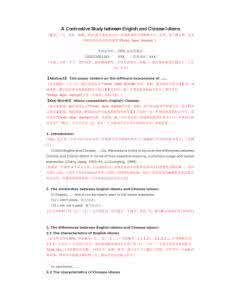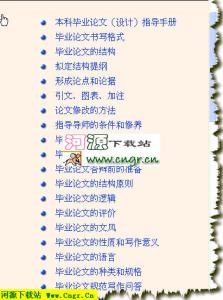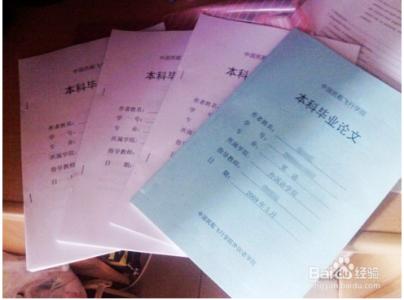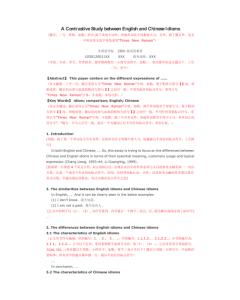On Extra-curricular Activities and Cultivation of English -牛bb文章网-Communicative Ability of College Students
Applicant: XX Supervisor: XX Faculty:
XXX
May 10, 2008
XXX University
Contents
摘 要 ................................................................................................................................................ii Abstract ........................................................................................................................................... iii
1. Introduction ................................................................................................................................... 1
1.1 The Significance of Topic ................................................................................................... 1
1.2 Research Methods ............................................................................................................... 1
2. Theory Research ........................................................................................................................... 1
2.1 Linguistics Rationale ........................................................................................................... 1
2.1.1 Theory of Communicative Competence by D. H. Hymes ........................................ 1
2.1.2 Theory of Communicative Competence by Canale & Swain .................................. 2
2.1.3 Theory of Communicative Competence by Bachman.............................................. 2
2.2 Theoretical Basis of the Topic ............................................................................................. 2
2.2.1 Piaget's Theory ......................................................................................................... 2
2.2.2 American Scholar--Alan Andean &Weir about ―Role Play‖ ................................... 3
2.3 Related Studies .................................................................................................................... 3
2.3.1 Researches Abroad ................................................................................................... 3
2.3.2 Researches in China ................................................................................................. 3
3. Presentation of the English Teaching ............................................................................................ 4
3.1 The Drawbacks of Traditional Teaching Methods .............................................................. 4
3.2 Modern Interest Teaching——CLT .................................................................................... 4
3.2.1 Definition of CLT .................................................................................................... 4
3.2.2 The Content and Substance of CLT ......................................................................... 5
3.2.3 CLT in the Use of English Out-of-class Activities .................................................. 6
4. Out-of-class Activities and Cultivation of Communication Ability ............................................. 6
4.1 The Role of Out-of-class Activities in Training of Communication Ability ....................... 6
4.2 Current Situation of College Students’ Out-of-class Learning ............................................ 7
4.3 Analysis on the Causes for Problems .................................................................................. 8
4.4 Carrying Out the Out-of-class Activities in Scientific and Effective Way .......................... 9
4.5 A Suggested Framework for Strategy Study ..................................................................... 11
4.5.1 Introduction ............................................. ............................................................... 11
4.5.2 An Out-of-class English Learning Center .............................................................. 11
5. Conclusion .................................................................................................................................. 12
Bibliography ................................................................................................................................... 14
i
摘 要
美国社会语言学家Dwell Hymes认为,交际能力不仅包括对一种语言的语言形式的理解和掌握,而且还包括对在何时何地、以什么方式对谁恰当使用语言形式进行交际的知识体系的理解和掌握。作为课堂的延伸和补充,课外活动在提高大学生英语交际能力方面起着至关重要的作用。课外活动能创造交际活动情境,使学生充分发挥主体性、能动性和创造性,促使学生语言交际能力的和谐发展和学生素质的全面提高。本文从应用语言学的角度探讨大学生英语课外活动课程的实施理念与实践,其目的是培养学生运用 英语交际的兴趣,提高英语语言能力,发挥个性特长,发展思维能力和交际能力。最后根据研究,本文提出旨在培养优化大学生课外学习的策略,并提出了建立课外英语学习中心的设想,用以配合策略培训,促进课外自主学习。
关键词:大学生 交际能力 英语课外活动 学习策略
ii
Abstract
American society linguist Dwell Hymes thinks: Communicative competence not only includes the understanding and grasp to a form of language, but also includes the understanding and mastering in when and where, and how and to whom to use language appropriate form of the communication systems of knowledge. As an extension of the classroom, out-of-class activities play a vital role in improving the capacity of college English communication. It can create communication situation, so that students can bring full play with initiative and creativity. Improve the communicative ability and develop the quality of the s tudents comprehensively. From the perspective of Applied Linguistics, this essay tries to study the idea and practice of English activity course in college school, for the purpose of fostering students’ interest in English communication,improving their English language ability, giving full play to their individuality and specialty and developing their thinking ability and communicating ability. Finally, in order to improve the college students' learning strategy, the essay will provide a suggested framework for strategy training based on the results of this investigation.
Key words: college students, communicative competence, learning strategies, out-of-class activities
iii
1. Introduction
1.1 The Significance of Topic
English is the international language of the common. In order to learn advanced scientific knowledge in the developed countries, to strengthen economic trade with all countries, the importance of English is easily obvious. However, the teaching methods and teaching effectiveness of our schools in China are worrisome. In the recent years people usually think the English condition of Chinese students as ―mute English‖ or ―deaf English‖. Their English learning starts from the primary school, with a long period of seven years, eight years, or even 10 years, they still can not use English to make dialogue, can not understand when the Britain and the Americans speak. The reason is that the exam-oriented education can cultivate students who are only good at examinations, overlooking to raise their overall quality. Out-of-class English learning may enable them related knowledge, further their skills.
1.2 Research Methods
The main methods for the study are insisting on combining the theory with practice and widely referring to the domestic and fore ign literature material. On the basis of this analysis and research, some regular understandings are to be summarized. Put forward proposals to improve.
2. Theory Research
2.1 Linguistics Rationale
2.1.1 Theory of Communicative Competence by D. H. Hymes
In 1972, Hymes delivered a speech entitled ―On communicative competence‖, put ―communicative competence‖ as a highly complex system of the knowledge and skills. It can be summarized as a person’s ability to use the language. It mainly
1
includes four aspects: grammaticality, acceptability, appropriate, and actual operational. The communicative competence is including a person's language knowledge, society cultural knowledge, literary knowledge, cognitive capacity, emotion factor and other knowledge. Therefore, foreign language teaching's duty cannot merely confine to the instruction of language knowledge. His ―On communicative competence‖ theory has provided the theory basis for communicative language teaching.
2.1.2 Theory of Communicative Competence by Canale & Swain
In the 1980s, Kanami and Swindon theory of communicative ability enriched the theory of Hymes. They think that communication capabilities include: Grammar ability, social language skills, discourse competence and strategy ability. The practice has proved that their theory is the guiding of the language teaching and standard of the testing programmatic.
2.1.3 Theory of Communicative Competence by Bachman
On the basis of various theories, Bachman concluded and proposed the theory of communicative language ability. He believes that communicative language ability is composed of three parts: language competence, strategy ability and psychological mechanism capacity. Apart from enriching exposition of the language ability, the strategy will be in the capacity as an independent part of the language skills. And explain the relative importance of implementation factor.
2.2 Theoretical Basis of the Topic
2.2.1 Piaget's Theory
Constructivist learning concept proposed that knowledge is not simply to be taught by teachers, but to be learned by each student in a certain situation (social and cultural background).Students can obtain knowledge and information by making use of other people, using the necessary learning materials through interpersonal cooperation, and taking the initiative to construct meaning. Therefore, the "situation",
2
"collaboration" and "conversation" and "constructing meaning" are the four elements in the learning environment.
2.2.2 American Scholar--Alan Andean &Weir about “Role Play”
―Role play‖ teaching model will simulate the process of contact between members of the society. Students through the way of consultation, study each kind of academic knowledge, in order that they can solve the social problem effectively in the future.
2.3 Related Studies
2.3.1 Researches Abroad
The overseas studies on out-of-class activities may trace to the Plato and Rousseau time. Plato is the renowned philosopher in ancient Greece. He advocates ―the child play-ground‖ educational mode. That is the prototype of extra-curricular activities. By the time of French Enlightenment and Rousseau (18th century), "direct experience" has received wide acceptance. Rousseau stressed "outside world without books, no materials oth er than the facts", and advocated "natural" mode of education. To the United States in the 19th century, the first school in the world which use activity curriculum theory as teaching guidance--- Dewey's Chicago experimental school, has founded. With 1896---1903 Dewey Chicago experimental courses in school activities the United States began to criticize the traditional courses. Instead of it are the out-of-class educational activities. These activity courses are based on the pragmatism, lasted more than 50 years in American schools, and their affects are profound and widespread.
2.3.2 Researches in China
In our country, no matter what stage, these courses have different names, for example, out-of-class activities, the second classroom, class activities, integrated social practice and so on. The process of changes is closely related to our theoretical study courses. In history, the development of activity courses is closely related the
3
progress and reform and guiding rules of the government.

3. Presentation of the English Teaching
3.1 The Drawbacks of Traditional Teaching Methods
Reviewing the traditional English teaching method, in the past decades we have indeed made the very big progress. But with social progress and development, its shortcomings are also increasingly revealed.
First, because the Chinese test system is imperfect, the traditional English teaching method is just an examination-oriented education model. In this teaching, evaluation of English level is to see the scores. This causes many students to get a high score, but they can not communicate with people using English. Secondly, in the traditional English teaching, teacher is the leader, takes the most important part in the classroom. The teacher stands on the platform proposing the questions, analyzing and explaining them, grasping the entire teaching process. And the student is just passive audience, understands the content passively, and records the massive notes. Such teaching method does not have interaction; hardly train student’s communicative ability and language ability. Third, in teaching, to stress the accuracy of knowledge, teachers usually use Chinese to explain.
So students have very little opportunity to communicate using English. Obviously, the traditional English teaching is knowledge-based. Compared with the language plastic function, it pays more attention to the form of language and the grammatical function, rather than raises the communication and utilization ability of it.
3.2 Modern Interest Teaching——CLT
3.2.1 Definition of CLT
The content of communicative language teaching is mainly on the language functions. Emphasis carries on language teaching in the real scene, advocating teaching process to socialization, and cultivating the ability of application, studying
4
for the purpose of application. While prominent communicative language teaching, auxiliary by some grammar, translation, sentence and so on, is based on the goal to promote the culture language communicative competence.
The core of communicative language teaching is to put the teaching process as a process of communication. The basic principles of teaching may be summarized:
The language is the information carrier, is the tool of communications. The language teaching must realize communication through each kind of activities.
Language utilization's smoothness is more important than accuracy. Making mistake is natural and inevitable; we may correct them gradually in the learning process.
Students should take the main part in teaching process. The teacher must stimulate the students' enthusiasm and initiative participation; make students enhance communication ability in the language utilization. Communicative language teaching advocated the fully participation of the students. Teacher's duty is to provide and create the real human relations scene, enable students to utilize the language freely and initiatively.
3.2.2 The Content and Substance of CLT
The purpose of the communicative language teaching is to cultivate students' communication ability. It’s the heuristic method of teaching. Induce the students to speak English boldly. Provide as much as possible drill opportunities for students. But it does not mean that the communicative language teaching only pays great attention to the oral English, repelling the grammar teaching. The cultivation of communication capability should manifest in the form of four aspects of listening, speaking, reading and writing. Indeed, in communicative language teaching, some teachers pursue the spoken language simply, no matter whether the students can follow and understand or not. As a result the majority of students only learn some spoken languages, but the knowledge study is not solid, and polarization appears obviously. This indicates that these teachers do not understand the communicative language teaching rightly and completely.
5
In the teaching, listening, speaking, reading, writing is inalienable and related closely. They are interactive with each other. The teacher should help student get knowledge, rather than instill it into the students. There have been interactions between teachers and students. They should coordinate closely, complete the instruction together.
3.2.3 CLT in the Use of English Out-of-class Activities
According to students' major character and employment need, make sure student's understanding domain, emotion domain and skill domain, and then carry on the goal stipulation in detail. Arrange the out-of-class activities content, thus establish English out-of-class activities target system. And the process of teaching is the process in which teachers and students interact with each other. The teacher should give students enough free space to display, do not criticize them eagerly, point out mistakes, make the summary or decide the answer. This may avoid students being discouraged, but cause them to have the sense of achievement, form the interests in the communicative activities. The expression of students is limited; teachers should adopt various means to enable students to have sufficient information added, and quickly change into actual communication ability. In addition, the design of English out-of-class activities is diversified. It c an make teachers to teach through playing, cause the student to become the truly independent learner gradually.
4. Out-of-class Activities and Cultivation of Communication Ability
4.1 The Role of Out-of-class Activities in Training of Communication Ability
Out-of-class activities are an effective way to develop communicative competence. The classroom instruction and the out-of-class activities are two important constituents in the foreign language teaching system. The foreign language classroom instruction is the basic teaching form, plays the leading role. However, it is undeniable that out-of-class activities play an active role in cultivating communicative
6
ability. It can consolidate and strengthen the classroom knowledge, so that the knowledge can be improved further through out-of-class activities. The theme of extra-curricular activities can be combined with classroom teaching. They infiltrate mutually, the glossary is related to classroom subject, the sentence and language synthesis utilization ability which could be improved gradually in the practice of out-of-class activities.
The goal of foreign language extra-curricular activities is just to enhanchttp://www.niubb.net/e the ability of students' language communication. These hot topics of life as well as various practices, with the real natural language environment, could arouse students' study enthusiasm and display their intelligence. Let students study and consolidate English in each kind of activities, enhance their foreign language communication skills.
4.2 Current Situation of College Students’ Out-of-class Learning
As we know,English learning is not restricted in class,and out-of-class learning is also a very important part. Especially for college students, their class time is very limited, so their English learning has to depend on their out-of-class learning. As pointed out by professor Zhe, from Beijing University, there are only 288 class periods for college students, while language learning is arduous work. Class time is very limited, so we should teach students how to learn English rather than teach English. As we know, to a great extent, their English proficiency depends on their own learning. Compared with in-class learning, out-of-class learning is particularly important. It has its unique advantages: first, there is plenty of spare time to exploit for learners, which is the crucial condition for successful learning; second, out-of-class learning can provide learners real world practice. Additionally, they can help learners broaden their scope of vision and cultivate their learning ability. But for a long time, influenced by our traditional teaching and learning, college students’ out-of-class learning is far from being satisfactory. The disordered phenomena in learning are very serious, exactly, most college students just learn English blindly according to their own interests, lacking systematical learning plan. Especially, for the
7
freshmen and second-year students, they are often free at beginning and busy when an examination is coming, so their out-of-class learning is often at will and loose. That is to say they have no goals, no directions and no management. They often feel nothing to do or don’t know how to do. What’s more, most of them are used to depending on the teachers and the textbooks and not accustomed to the learning situation without homework.
On the other hand, to our disappointment, facing this serious situation, the colleges and the teachers don’t carry out effective measures to organize and direct the students’ out-of-class learning. The phenomena become a big barrier for learners to promote their English proficiency. Therefore now, changing this unfavorable situation becomes an urgent task.
4.3 Analysis on the Causes for Problems
After you have learned the current situation of the college students’ out-of-class learning, I think you can’t help asking what the cause for this serious situation is. Of cause, the reasons are various. Taking the college students’ features of out-of-class learning into consideration, we find that the basic cause is the students’ previous English learning experience.
Before these students came to college, they had six or seven years of English learning. This learning experience has laid strong influence on their current college English learning. The teachers nearly dominate every aspect of the learners’ learning, including their out-of-class learning, and the students seldom get the real independent out-of-class learning, most of the out-of-class learning is devoted to homework or other tasks required by the teachers. In learning, the learners are usually led by their teachers and don’t have to decide how long they should learn and what materials they should choose. Gradually, the learners began to depend on the teachers for everything in learning; as a result, students have long been accustomed to learn dependently. They tend to depend on one or two books and the teachers, while they are not aware of the crucial role of themselves. Inherently, this kind of learning experience leads to the lack of the learning strategies.
8
We find that the students are exactly lacking three groups of learning strategies. First, they do not have the necessary meta-cognitive strategies, so they just blindly learn according to their interests. The situation inevitably leads to no plans, no goals and no directions. That is why many students claim that they get used to constant compulsion, supervision and assignment deadlines, for they feel unable to timetable themselves and take responsibility for their own learning if no one forces them. Second, they have no appropriate cognitive strategies to approach their specific language learning and to solve the specific problems in learning. As a result, even though some students show their opposition to depending on the teachers; they are at a loss on how to deal with them, when lacking the appropriate cognitive strategies. The same is true for their social affective strategies. In a word, the lack of strategies gets its way to their dependent language learning.
4.4 Carrying Out the Out-of-class Activities in Scientific and Effective Way
How to carry out the out-of-class activities scientifically and effectively? I think we have to pay attention to the following three aspects:
First, the socialization of the activity courses. Oral language is the face-to-face communication, so information interaction is very important. Students and teachers (or students) talk about the social life which closely related to the hot issues. These topics often can lead to great interest in students, such as: love values, the pros and cons of computers and television, population growth, fake and shoddy, consumption, the increase of tuition, family relations, and some plan of the future. We are very sensitive to these topics. So they often talk about them with highly interest, and the language is rich. It is of practical significance for students to study foreign language communication. Teachers also can organize the language practice, for example: weekend excursions, shopping, picnics, and so on, organizing ——http://www.niubb.com/——students to listen English news, watching films, videos and television, because these modern media can provide standard English and lots of western cultural. Simultaneously they can mobilize students to use their own eyes and ears. In addition, the organization of
9
[www.wenzhangwo.com] 爱华网
爱华网



